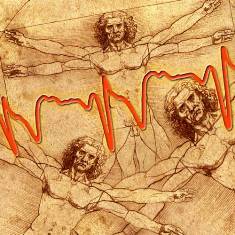Long-Term Disability Claims Resulting from Stress in the Executive Occupation
Although courts recognize that many high profile individuals, including former Vice-President Cheney, President Eisenhower and Associate Justice Stevens, returned to work after suffering a heart attack, the disability benefit experts of MyLTDbenefits.com develop and successfully argue each case based on its own particular facts and circumstances. Disability claims are common in both the corporate and financial sectors for stress related conditions, including heart attacks.
 For example, following by-pass surgery, Abdel-Malek, a physiatrist, returned to work on a part-time basis and thereafter sought disability benefits. Lina terminated benefits claiming that the plaintiff was capable of full time work. The consultant testified that the plaintiff has a significant risk for future cardiac episode if he continues to work in his present environment and the risk is substantially higher than for someone not in the same environment. The treating cardiologist testified that Dr. Abdel-Malek was playing Russian Roulette with a future cardiac event that would be likely to be catastrophic if he remained at his current work capacity. The court concluded that it was reasonable for this plaintiff to stop working. Furthermore, the attorneys of MyLTDbenefits.com argue persuasively in such cases that an effort to work even when it’s to the individual’s detriment does not equate with the finding of lack of disability.
For example, following by-pass surgery, Abdel-Malek, a physiatrist, returned to work on a part-time basis and thereafter sought disability benefits. Lina terminated benefits claiming that the plaintiff was capable of full time work. The consultant testified that the plaintiff has a significant risk for future cardiac episode if he continues to work in his present environment and the risk is substantially higher than for someone not in the same environment. The treating cardiologist testified that Dr. Abdel-Malek was playing Russian Roulette with a future cardiac event that would be likely to be catastrophic if he remained at his current work capacity. The court concluded that it was reasonable for this plaintiff to stop working. Furthermore, the attorneys of MyLTDbenefits.com argue persuasively in such cases that an effort to work even when it’s to the individual’s detriment does not equate with the finding of lack of disability.
In a similar case, the court held that the long-term disability insurer abused its discretion in denying benefits to a Government Affairs Manager who had suffered a heart attack and stroke in concluding that cardiac condition had stabilized sufficiently to enable claimant to perform sedentary work when medical evidence demonstrated that the claimant’s condition was “stress sensitive” and the insurer failed to consider the “risk that the [claimant]may suffer another heart attack or stroke.”
In Cunningham v. Paul Revere Life Insurance Co., the court considered a disability claim filed by the Vice-President of Sales and Marketing for a Yachting company. His job required working approximately 60 hours per week, continuous travel, and development of marketing strategies for a volatile and “highly competitive market.” The claimant had his first heart attack in 1987, but returned to work and continued working until his second heart attack in 1998. Although the insured attempted to return to work after the second heart attack, he was unable to perform his duties. After paying benefits for two years, the insurer terminated benefits because the claimant’s medical records reported he was “doing well.” The undisputed medical evidence proved that the claimant had suffered two heart attacks by the time of his disability and had a severe “cardiomyopathy and very low ejection fractions.” Additionally, all of the claimant’s physicians testified he was totally disabled, emphasizing that the stress of the claimant’s job would put him at risk for severe complications. Indeed, the treating physicians explained that the insured was “doing well,” in part, because he was away from the stress of his occupation. Conversely, the insurer’s reviewing physicians failed to give appropriate consideration to how the occupational demands might “exacerbate his already precarious coronary condition.” The court held that the insurer, by “ignor[ing] the overall effect [the claimant’s] occupation might have on his cardiovascular health[,]” abused its discretion in denying the claimant disability benefits. The disability benefits lawyers at MyLTDbenefits.com understand the importance of presenting medical evidence in proper scope and context in order to defeat the LTD carrier’s efforts to put their own spin on the evidence.
In Nave v. Fortis Benefits Insurance Co., the court considered a claim from a computer company president and CEO who had suffered two heart attacks and continued to have ischemia. The insurer, in denying long-term disability benefits, noted that a year after the claimant’s heart attacks he was “totally asymptomatic,” and that during a recent stress test the claimant was able to exercise at twelve METS normally. The insurer determined the claimant was able to “perform[ ] a wide variety of sedentary work including his own occupation as President/C.E.O. of his company.” The claimant’s treating cardiologist, however, emphasized that the claimant’s improvement was only because the claimant was not working in his high stress job. Based on the conflicting opinions of the claimant’s medical condition and the impact of his high stress occupation, the court found summary judgment was inappropriate.
Contact the attorneys of MyLTDbenefits.com to discuss your long-term disability claims resulting from stress in the executive occupation in detail at 262-785-9606.
